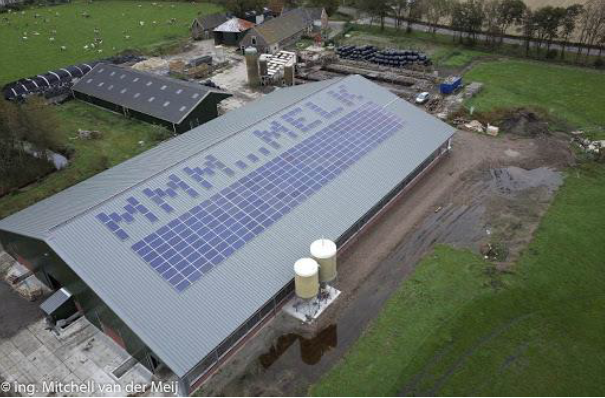Agriculture and land use
The agricultural sector plays a crucial role in the energy transition, since it has the space to produce renewable energy in sufficient quantities. Commercial growers are often innovative entrepreneurs that can provide the momentum for a number of developments. The greatest challenge lies in matching sustainable energy production and demand at the local level.
Public-Private Partnership on energy and agriculture
Stedin is participating in the Public-Private Partnership (PPP) on energy and agriculture with participants from Wageningen University Research, LTO Noord, Alliander, the Netherlands Organisation for Applied Scientific Research, Petawatts and Windunie.
Many farmers are becoming more sustainable by installing solar panels on their buildings. Approximately 90% of the electricity generated in this way is fed into the electricity grid, which may require Stedin to reinforce its grids. In the PPP, we examine whether it is possible to increase farmers' consumption of the electricity they generate themselves, as part of efforts to further enhance sustainability in agriculture.
The report titled 'Maximum renewable production without grid reinforcement' was published in 2020. This report examines the electricity consumption of farmers and considers which part of this can be flexibly met when the solar panels are supplying electricity.
The study shows that an average farmer, through smart matching of consumption, can install an additional 260 solar panels without having to reinforce the connection.
For 2021, a pilot will be developed in the 'Hoekse Waard' with two alternative potential solutions: creating green hydrogen for hydrogen-powered tractors for diesel-free agriculture in partnership with a group of farmers and using thermal storage across multiple seasons for post-harvest cooling. The pilot will include 39 farms around Klaaswaal.
Commercial growers deliver flexibility
In Zuidplaspolder, commercial growers are helping to unburden the electricity grid. In 2020, Stedin entered into contracts with AgroEnergy and Tenergy, who are in contact with commercial growers in Zuidplaspolder.
Growers who are willing to do this are compensated for their flexibility.
Together with three commercial growers, AgroEnergy and Tenergy can 'move' a total of five megawatts of electricity in Zuidplaspolder. This roughly equates to the capacity needed to supply 5,000 households (comparable with the town of Moordrecht) with power. Stedin, AgroEnergy and Tenergy are currently making preparations for implementing this initiative.
In addition, Stedin registered the first group of more than 10 commercial growers on the grid operators platform GOPACS in 2020. In this way, they, together with other participants, are increasing the availability of flexibility in the market. Flexibility crucially depends on the presence of enough participants with flexible demand for or production of electricity. You can read more about flexibility here.


Crucial craftsmanship: Frederique Ankone
Frederique Ankone is a project coordinator at Meters & Connections Complex. What does 'crucial craftsmanship' mean for her? 'During the lockdown, we carried on with work that could be done from a laptop; the fitters, by contrast, were stopped in their tracks. It was difficult to stay motivated: what are we doing it all for?'
>What makes your work of vital importance? In other words, why is your work important for the organisation and society?
'Together with a colleague, I am in charge of directing work to replace obsolete electrical connections. I am responsible for the region of The Hague. When we began the smart meters project, we came across jute wiring, main junction boxes with asbestos cords and Weber boxes. These are often located in old staircase-accessed flats. We decided to start up a project to replace them all, as the meter replacements could no longer be done safely or carried the risk of causing outages. Lots of things need to be arranged, from soil surveys to temporary road closures. My work is of vital importance for ensuring the safety of electrical connections.'
>How do you recognise a professional in your field?
'To me, being a professional is not so much about knowledge as about drive, about wanting to realise your full potential and always looking to learn more. To me, that is a valuable attribute and a foundation for achieving a great deal. I am pleased to work with lots of colleagues with a strong drive.'
>What has working been like for you during the lockdown? What was different from normal and how did that affect you?
'It was pretty hectic when the first lockdown began. For a while, we had to suspend our project. We carried on doing preparatory work from home, but it was difficult to stay motivated: what are we doing it all for? Our goal is normally to carry out the work. When we got the all-clear to start again in July, I noticed that customer contact was easier than expected; there was very little hassle and people kept their distance. I do a lot of work from home, and that's fine, although I do miss my colleagues' input and the conversations at the coffee machine.'
>How do you ensure that you remain fit and healthy yourself?
'In January, I joined in with the programme run by our colleague Irving Aarnoutse, who was training to become a fitness coach at the time. We used to exercise together once a week, and now we have online sessions twice a week instead. There are 18 of us, all colleagues from work, and we improvise where necessary, with bottles of water as weights, for example. I also make an effort to keep up the lunchtime walk. As for my mental health, I'm glad to have lovely people around me.'
>What gives you the most satisfaction in your work? In other words, how does your work help you maintain vitality?
'I very much enjoy working around motivated colleagues. Together, we achieve good solutions. I also get enjoyment out of constantly improving processes. At the moment, I am working on an improved planning system that will make my colleagues' work easier. That gives me personal satisfaction.'
